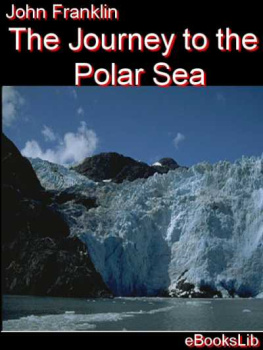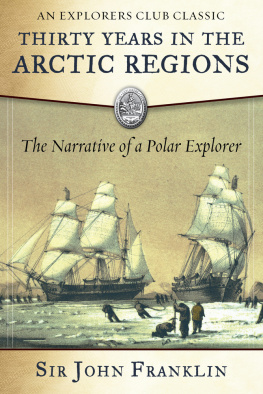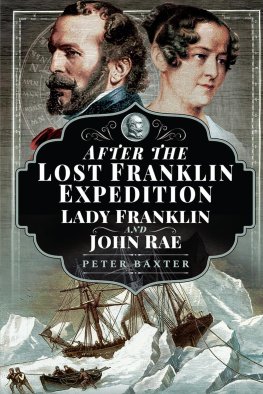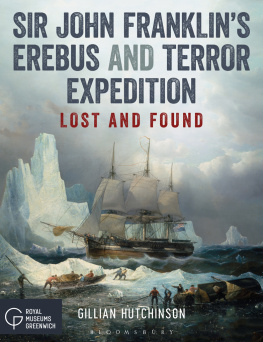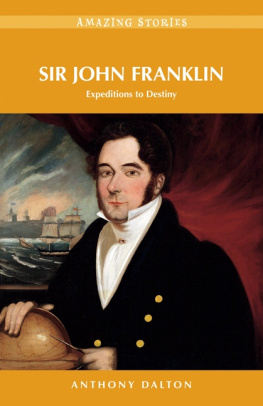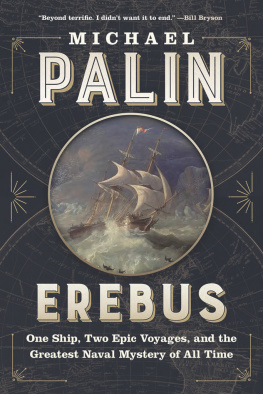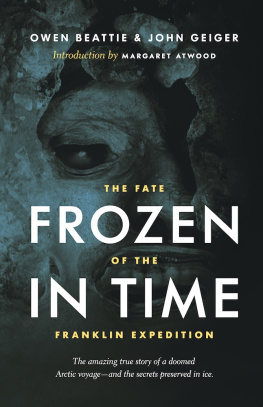FINDING FRANKLIN

Harpers Weekly, 29 October 1859 (Collection of the author.)
FINDING FRANKLIN
The Untold Story
of a 165-Year Search
Russell A. Potter

McGill-Queens University Press 2016
ISBN 978-0-7735-4784-1 (cloth)
ISBN 978-0-7735-9961-1 (ePDF)
ISBN 978-0-7735-9962-8 (ePUB)
Legal deposit third quarter 2016
Bibliothque nationale du Qubec
Printed in Canada on acid-free paper
McGill-Queens University Press acknowledges the support of the Canada Council for the Arts for our publishing program. We also acknowledge the financial support of the Government of Canada through the Canada Book Fund for our publishing activities.
Library and Archives Canada Cataloguing in Publication
Potter, Russell A., 1960, author
Finding Franklin : the untold story of a 165-year search / Russell A. Potter.
Includes bibliographical references and index.
Issued in print and electronic formats.
ISBN 978-0-7735-4784-1 (cloth). ISBN 978-0-7735-9961-1 (ePDF). ISBN 978-0-7735-9962-8 (ePUB)
1. Franklin, John, Sir, 17861847. 2. Erebus (Ship). 3. Shipwrecks Canada, Northern. 4. Northwest Passage Discovery and exploration British. 5. Arctic regions Discovery and exploration British. I. Title.
G660.P68 2016 | 919.8 | C2016-902075-4 |
C2016-902076-2 |
For my children, Brendan, Noah, and Caeli.
Voyagers all.
Contents
Epilogue:
Last Man Searching
Appendix:
Franklin Searches, 18542015
Acknowledgments
Its been said that undertaking historical research is not unlike entering a crowded room where a lively conversation has been carried on since long before one was born. One must catch at a word, a phrase, or a friendly voice, feeling ones way about until it all begins to make sense, before one dares to ask the first question.
The list of voices among which I found my own must begin with Dave Woodman, who receiving an e-mail from a total stranger some twenty-odd years ago, took care to respond in detail, considering no line of questioning unworthy of consideration; our correspondence in the years since has been invaluable. Early on in my researches, an informal e-mail list of Franklinites, as we came to call ourselves, began to grow: Margaret Bertulli, Anne Keenleyside, Dave Mullington, Wayne Davidson, John Harrington, Ron Rust, David Meagher, George Hobson, Rebecca Harris, Dorothy Eber, Tom Gross, and Jim Delgado were among that excellent company in those early days. As the web has grown, this list merged into and was subsumed by others, most recently by the Remembering the Franklin Expedition Facebook group: Lee Preston, Kristina Gehrmann, Alan Hoch, Louie Kamookak, Ralph Lloyd-Jones, the anonymous Ship Modeler, Paul Van Peenen, Mechtild Opel, Glenn Marty Stein, Bill Greenwell, Randall Osczevski, Ted Betts, Frank Schuster, Ro Braine, Peter Carney, William Battersby, Chris Valade, the late Garth Walpole, and so many others have taken up the call, and no question or query has arisen among us that hasnt had the benefit of the groups collective wisdom. I owe a special debt to several of its members Andrs Paredes Salvador, Regina Koellner, Russ Taichman, Wolfgang Opel, Bill Greenwell, and Jonathan Dore for their assistance with the books illustrations. It would be a far less colourful book and world without them.
Among the friends and kindred spirits who have been especially important to me, I must also mention Doug Wamsley, who has always put his knowledge, and his extraordinary collections, at my disposal; Huw Lewis-Jones, whose keen visual intelligence has been as vital a guidepost to me as the infamous Beechey Island pointing hand; and Kenn Harper, whose vast knowledge of Arctic and Inuit history is matched only by his great generosity of spirit. Along my way, I have also been the happy beneficiary of a great many other Arctic encounters and the fine friendships that have ensued. I think here of Kari Herbert, John Wilson, Larry Millman, Pete Capelotti, John Bockstoce, Glyn Williams, John Geiger, Michael Robinson, David and Deirdre Stam, Chip Sheffield, Michael Lapides, Ken McGoogan, Ernie Coleman, Joe OFarrell, Seamus Taaffe, Doreen Larsen Riedel, Lady Alexandra Shackleton, Nancy Campbell, Andrew Lambert, and all those who have ever clinked a glass at OBriens Pub in Athy. Go raibh maith agaibh!
I owe, as always, an irreparable debt to the libraries, museums, and archival collections where so much that is a part of these histories is preserved, and whose librarians and curators are the sine qua non in any researchers work. My thanks especially go to Karen Ryan at the Canadian Museum of History, Claire Warrior at the National Maritime Museum in Greenwich, Willow Silvani at the Scott Polar Research Institute, Amelia Fay at the Manitoba Museum, and Stephen Loring at the Smithsonian Institution. Lastly, to my family, and to those non-Arctic friends who have put up with my obsession for all these years, my deepest thanks for their support and patience.
Editorial Notes
A NOTE ON FRANKLIN SEARCHES
The period of 165 years covered in this book begins in 1849 the year that the first major search for Franklin launched by the Royal Navy returned home having found no trace of Franklin or his ships. Its then that we can begin to speak of a Franklin mystery then that the key elements that have made this story so fascinating for so long hope, disappointment, and speculation first came together. From then until 1859, the search for Franklins ships and men encompassed following the criteria of W. Gillies Ross roughly three dozen organized efforts. Of the other searches in this period, though, only two brought back significant Inuit testimony as well as physical relics, those of Dr John Rae and Sir Francis Leopold McClintock; no other searches of that era, however significant in terms of the areas they charted and traversed, added to what was known about Franklins fate. Its no slight to them their efforts were no less important but in retelling the story of the Franklin search, my goal has been to focus on the discoveries of those searchers whose work has contributed to the reconstruction of the movements of Franklins men and ships, up to and including the discovery of HMS Erebus in 2014.
A NOTE ON USAGE AND SPELLING
This book draws on a wide array of historical sources; as a rule, when quoting from printed or manuscript materials, I have reproduced their original spelling. The word Eskimo, and its earlier variant Esquimaux, is given in such sources, though its use is considered pejorative today; in my own text, Inuit is always used. Some earlier texts spell this word Innuit and use it as though it were singular (it is plural) as above, these spellings are preserved in quotations only. Inuit names and words in the Inuktitut language pose another question; in the original quotations I have likewise preserved the (sometimes idiosyncratic) spellings of names, preferring one such spelling (e.g., Su-pun-ger) over variants to avoid confusion. Contemporary Inuit names and Inuktitut words are spelled according to modern orthography and given in italics at their first appearance.

Next page

